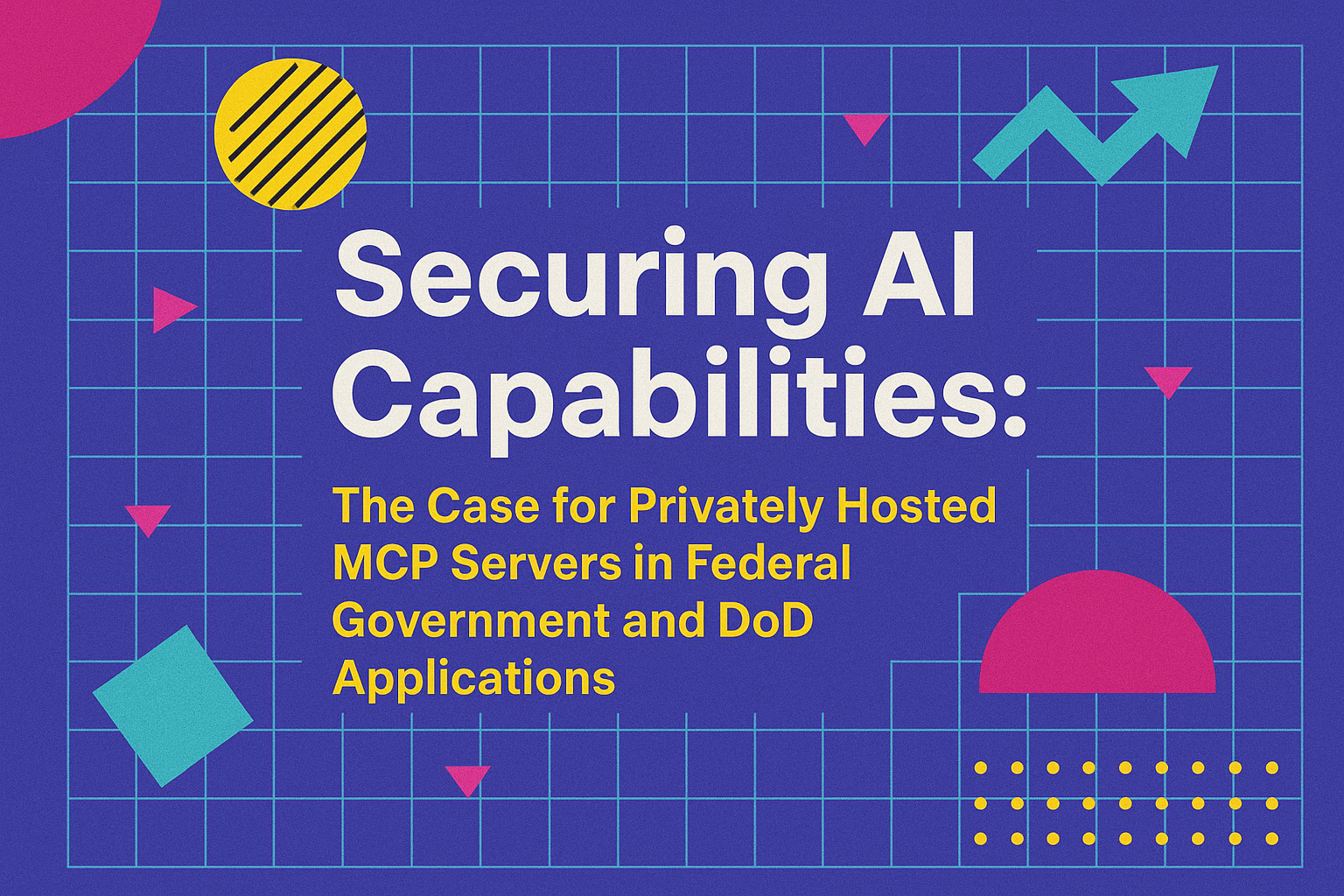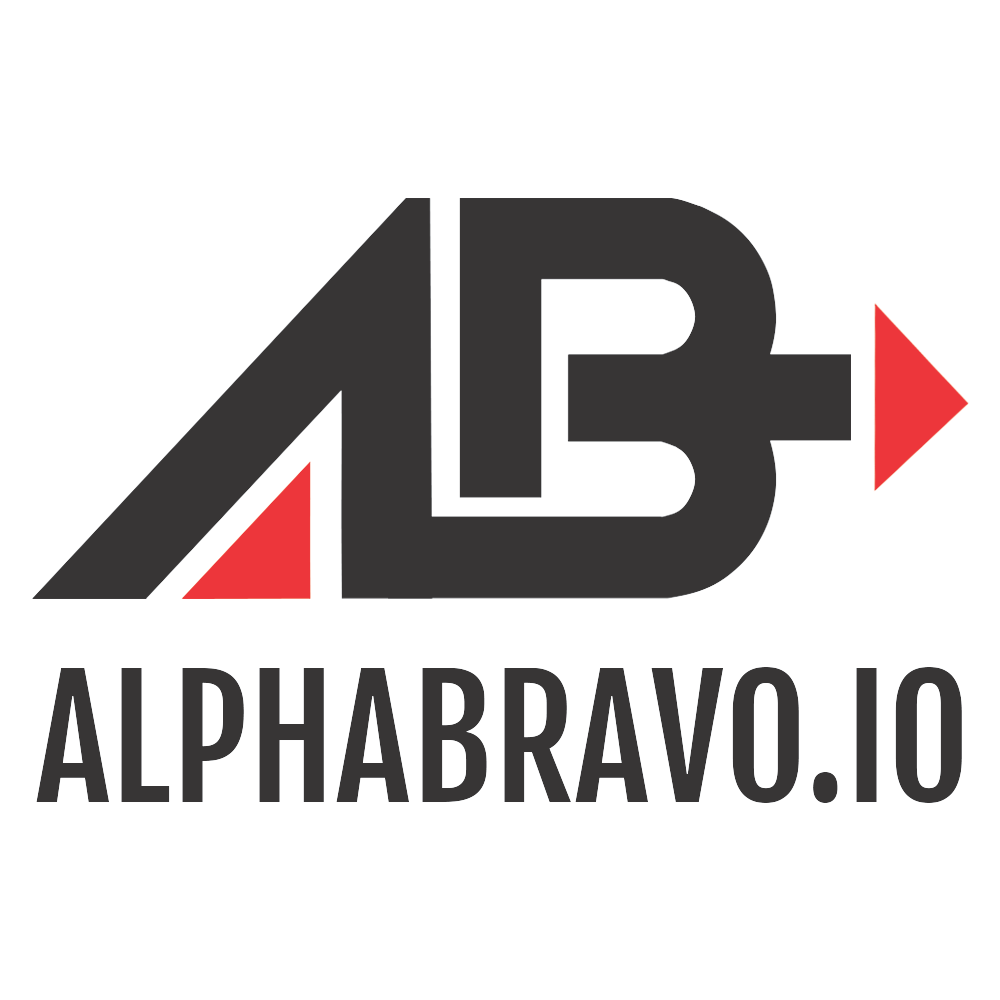Securing AI Capabilities: The Case for Privately Hosted MCP Servers in Federal Government and DoD Applications
To unlock the full potential of agentic AI in government and DoD environments, secure, privately hosted MCP servers—backed by AlphaBravo’s hardened container expertise—are essential to meet mission-critical security and compliance demands.

The rapid evolution of agentic AI is transforming how government agencies approach mission-critical operations, automation, and data analysis. At the center of this transformation sits the Model Context Protocol (MCP), which has quickly emerged as the de facto standard for connecting AI agents to external tools and services. However, as federal agencies and DoD components integrate these powerful capabilities, they face unique security challenges that demand specialized implementation approaches beyond standard commercial solutions.
The Strategic Importance of Model Context Protocol in Government AI Initiatives
Model Context Protocols are revolutionizing how AI agents interact with external tools and data sources. As Docker notes in their recent announcement, "MCP is exciting. It's simple, modular, and built on web-native principles. We believe it has the potential to do for agentic AI interaction what containers did for app deployment – standardize and simplify a complex, fragmented landscape". This standardization creates tremendous opportunities for government agencies seeking to leverage AI for everything from data analysis to cybersecurity operations.
However, the current state of MCP implementation presents critical challenges. As Docker acknowledges, "MCP Clients and Servers hold enormous potential, but the experience isn't production-ready – yet. Discovery is fragmented, trust is manual, and core capabilities like security and authentication are still patched together with workarounds". These limitations become exponentially more concerning in federal environments where security requirements are stringent and regulatory compliance is non-negotiable.
The Federal Security Imperative: Beyond Commercial MCP Implementations
Federal agencies operate under strict security mandates that commercial solutions often struggle to satisfy. According to security researchers, current MCP implementations have several critical vulnerabilities that are particularly problematic for government deployments:
"MCP server packages currently lack digital signatures, preventing users from easily verifying their authenticity or integrity. Without digital signatures, there's no straightforward way to confirm that a package hasn't been tampered with or replaced by a malicious version". In a federal context, where supply chain security is paramount, this presents an unacceptable risk vector.
The security challenges extend further: "In the current landscape, attackers can upload MCP servers to unofficial repositories without undergoing security checks. These malicious MCP servers can be disguised with icons and branding from legitimate companies to deceive users". This type of deception could lead to catastrophic data exfiltration or system compromise in classified or sensitive government environments.
Docker MCP Catalog and Toolkit: A Foundation for Security Enhancement
Docker's recent introduction of the MCP Catalog and Toolkit represents a significant step toward addressing these security concerns. The platform offers "over 100 verified MCP servers in one place" with "publisher verification and versioned releases", creating a more trusted ecosystem for MCP tool discovery and deployment.
The Docker MCP Toolkit further enhances security by ensuring "tools run in isolated, containerized environments", aligning with container security best practices. As Docker explains, "Containers provide a strong layer of isolation between workloads, helping prevent one application from interfering with another or with the host system. This isolation limits the blast radius of a compromise and makes it easier to enforce least-privilege access".
For government agencies, this containerized approach offers important security advantages, including:
-
Enhanced isolation: "Because MCPs run inside Docker container images, they inherit the same built-in security features developers already trust and a rich ecosystem of tools for securing software throughout the supply chain".
-
Protection against emerging threats: The Docker MCP Toolkit "addresses emerging threats unique to MCP servers like Tool Poisoning and Tool Rug Pulls, by leveraging Docker's strong position as both a provider of secure content and secure runtimes".
-
Secure authentication: The system includes "built-in OAuth support and secure credential storage, enabling clients to authenticate with MCP servers and third-party services without hardcoding secrets into environment variables".
The Case for Private MCP Hosting in Federal Environments
While Docker's MCP Catalog and Toolkit provide substantial security improvements over ad-hoc MCP implementations, federal agencies-particularly those handling classified data or supporting DoD missions-require additional security measures that can only be achieved through private hosting solutions.
The security recommendations for MCP in high-security environments are clear: "To securely adopt MCP, organizations should first establish or rely on a trustworthy repository for MCP servers with rigorous verification and security vetting procedures". For federal agencies, this trustworthy repository must exist within their security boundary.
Private hosting offers several critical advantages for federal MCP deployments:
-
Supply chain integrity: Government agencies can implement rigorous verification of MCP servers before deployment, ensuring they meet NIST 800-53 and DoD RMF requirements.
-
Air-gapped operation: Many classified environments cannot connect to public repositories, necessitating privately hosted solutions that can operate without external dependencies.
-
Compliance with FedRAMP and DoD security requirements: Private MCP catalogs can be configured to meet specific government compliance mandates, including "vulnerability scanning requirements for containers" and "container security requirements guide (SRG)".
-
Integration with existing security infrastructure: Private catalogs can integrate with agency-specific PKI, identity management, and continuous monitoring solutions.
AlphaBravo: Bridging the Gap Between MCP Innovation and Federal Security Requirements
Successfully implementing private MCP infrastructure for federal clients requires specialized expertise in both container security and government compliance requirements. AlphaBravo brings unique capabilities to this challenge as "a leading provider of container and kubernetes based solutions to Government agencies" with deep experience in "removing barriers for streamlined IT processes, enabling our clients to focus on their mission".
AlphaBravo's approach to secure MCP implementation leverages our core competencies:
Specialized Government Container Security Expertise
As a Kubernetes Certified Service Provider with a track record of federal deployments, AlphaBravo understands the unique security considerations for containerized workloads in government environments. Our solutions directly address the challenges highlighted in NIST SP 800-190 (Application Container Security Guide), which "provides security best practices for containerized applications, focusing on threats, risks, and mitigation strategies across the container ecosystem".
Our experience with "Container Hardening, Automation and DevOps" as part of our SBIR Phase II work positions us to implement MCP servers with security controls that satisfy even the most stringent federal requirements.
Proven DevSecOps Implementation in Classified Environments
AlphaBravo's approach to secure MCP aligns with our broader DevSecOps methodology that has proven successful across federal projects. Rather than treating security as a final checkpoint, we integrate it "early and continuously throughout the software development lifecycle", avoiding the common pitfall of "waiting until production phases to address security, forcing teams to 'walk that whole process back to the beginning'".
This methodology is particularly critical for MCP implementations in federal environments, where security vulnerabilities could expose sensitive operations or classified data to unauthorized access.
Continuous Authority to Operate (cATO) Alignment
One of AlphaBravo's key differentiators is our expertise in helping agencies transition "from traditional Authority to Operate (ATO) processes to Continuous Authority to Operate (cATO)". This approach is ideal for MCP implementations, which require ongoing security validation as new tools are added to the catalog.
Our cATO approach ensures that "security requirements that specifically defend against advanced persistent threats (APTs)" are continuously monitored and validated, aligning with NIST SP 800-172 requirements for the most sensitive government information systems.
Implementation Framework: Secure Private MCP for Federal Agencies
Based on our experience with federal container security and the specific requirements of MCP, AlphaBravo recommends the following implementation framework for private MCP hosting:
1. Security-First Architecture Design
The implementation begins with a comprehensive security architecture that applies defense-in-depth principles to MCP deployments. This includes:
- Secure container registries with signed images and attestation
- Network segmentation to control MCP server access
- Comprehensive authentication leveraging existing federal PKI
- Fine-grained authorization for tool access based on least privilege
2. Automated Compliance Enforcement
AlphaBravo's approach leverages automation to ensure continuous compliance:
"Deploying comprehensive sandboxing and granting minimum access control to effectively isolate MCP servers and tools can significantly reduce the risk of security breaches. Sensitive configuration files containing credentials must be securely encrypted, supported by robust credential management solutions to minimize plaintext exposure".
Our automation capabilities ensure that these security controls are consistently applied across the MCP ecosystem.
3. Integration with Federal Security Infrastructure
Unlike generic MCP implementations, AlphaBravo's solutions integrate seamlessly with existing federal security infrastructure:
- STIG compliance automation for container images and orchestration platforms
- Integration with federal logging and SIEM solutions for comprehensive visibility
- Compatibility with existing identity and access management systems
- Support for MCP in IL6 environments where appropriate
This integration ensures that MCP capabilities enhance rather than compromise the agency's security posture.
4. Secure DevSecOps Pipeline for MCP Tool Validation
AlphaBravo implements a rigorous validation pipeline for MCP tools before they enter the private catalog:
"Regular auditing and timely updates of integrated MCP servers are essential to maintain compliance with evolving security standards, thereby preventing malicious MCP servers from entering and persisting within systems".
Our validation process includes static and dynamic security scanning, composition analysis, and cryptographic verification to ensure only trusted tools reach production environments.
Leading Federal AI Capabilities into the Future
The integration of secure, private MCP capabilities represents a critical step forward in the federal adoption of agentic AI. As government agencies seek to leverage these technologies for mission enhancement, the security infrastructure supporting these capabilities must meet the highest standards.
AlphaBravo is uniquely positioned to support this transition, combining deep expertise in container security, federal compliance requirements, and DevSecOps implementation. Our approach ensures that agencies can realize the full potential of MCP while maintaining the security posture demanded by federal standards.
As Docker's Mark Cavage and Tushar Jain noted, this moment for MCP "reminds us a lot of the early days of the cloud". Just as containers transformed cloud deployments, MCP is redefining AI capabilities-and AlphaBravo is committed to ensuring federal agencies can securely leverage this transformation.
To learn more about implementing secure private MCP for your agency, or to schedule a capability briefing, contact our federal solutions team. Let's build secure, mission-critical AI capabilities-together.
Learn more about Docker MCP Catalog and Toolkit at https://hub.docker.com/catalogs/mcp
Learn more about AlphaBravo at https://alphabravo.io/

